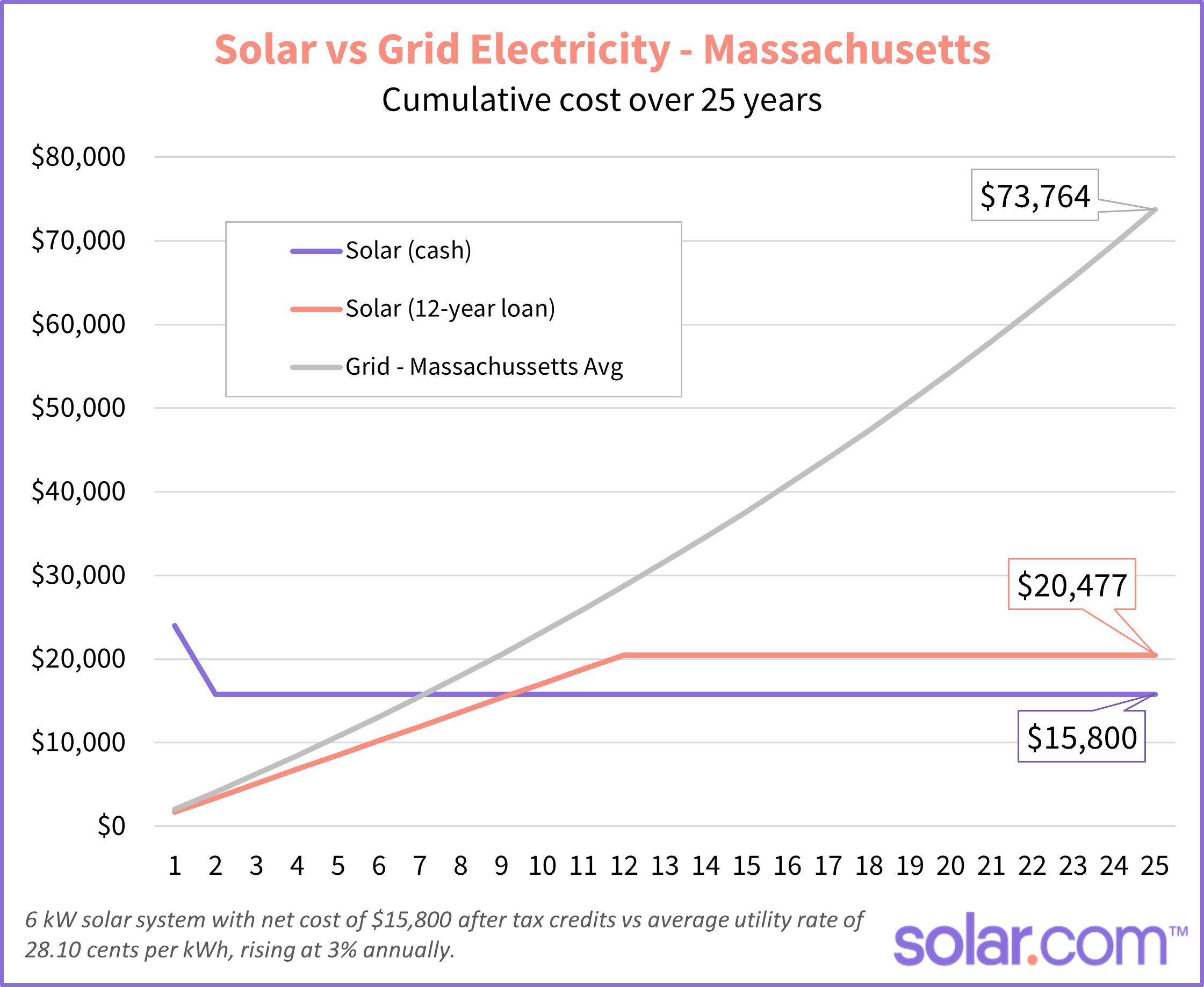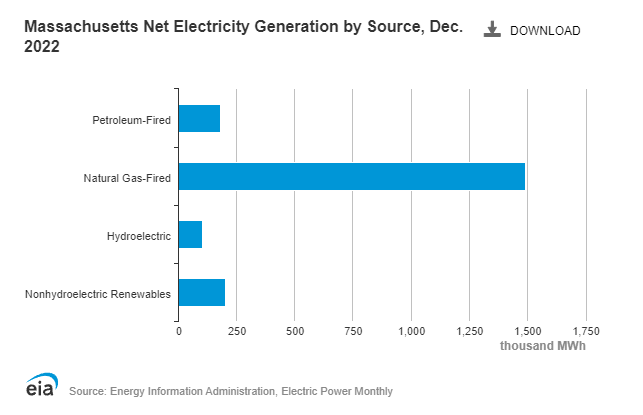5 Reasons to Go Solar in Massachusetts
Massachusetts is blessed with rich history, leading educational institutions, and successful sports franchises. And, thanks to local incentives and high electricity prices, Massachusetts is also one of the best states to save money by going solar.
In this article, we’ll explore five reasons why Massachusetts is a great state for home solar panels and how much you can save by going solar.
Let’s dive in with a recap of Massachusetts solar incentives and how much they reduce the cost of going solar.
Connect with an Energy Advisor to see which incentives you qualify for.
1. Massachusetts solar incentives
With a mix of federal, state, municipal and utility-based solar incentives, homeowners in Massachusetts can substantially reduce the cost – and increase the overall savings – of going solar.
Solar incentives available in Massachusetts include:
- State and federal solar tax credits
- Solar Massachusetts Renewable Target (SMART) program
- Municipal solar rebates
- Sales and property tax exemptions
- Net metering
Just the 15% Massachusetts solar tax credit and the 30% federal solar tax credit can reduce the cost of a solar system by 45%.
If you get your electricity from an investor-owned utility (Eversource, National Grid, or Unitil), you can get paid monthly for your solar production through the SMART program. Incentives in the SMART program vary based on your utility, solar production, and the price of electricity.
If you get your electricity from a municipal utility, you may be eligible for a substantial rebate for going solar. Municipalities with rebate programs include:
- Ipswich Electric Light Department
- Shrewsbury Electric & Cable Operations
- Wakefield Municipal Gas and Light Department
- Reading Municipal Light Department
- Hudson Light & Power
- Concord Municipal Light and Power
- Taunton Municipal Lighting Plant
Massachusetts also has sales and property tax exemptions for home solar systems. So, you won’t pay the 6.25% state sales tax when you buy a solar system, saving you $1,562 on a $25,000 system. You also won’t pay property tax on the value the solar system adds to your home for 20 years.
Finally, Massachusetts has a strong net metering policy that allows solar owners to earn credit for the excess energy they push onto the grid in order to offset the cost of pulling energy off the grid when their panels aren’t producing.
2. Electricity prices
In addition to rebates and tax credits, there’s another major incentive to get solar panels in Massachusetts: Electricity prices.
In November 2022, the average retail electricity price in Massachusetts was 28.10 cents per kWh – the fourth highest average in the US. For reference, the average electricity price in the US is around 16.5 cents per kWh and the average cost per kWh of a home solar system is around 6-8 cents per kWh.
The other thing to consider is that while utility electricity prices increase over time – typically by 3-5% per year – having a home solar system flattens freezes your electricity costs at a low, predictable rate.
Here’s how paying for solar versus grid electricity in Massachusetts looks over the 25 year warrantied life of a solar system.

Given Massachusetts’s sky-high electricity prices, the payback period for going solar is relatively short and there is enormous potential for lifetime savings.
3. Massachusetts’ dirty electricity grid
Between incentives and high electricity prices, home solar can clearly help Bay Staters save money on energy costs. But that’s only half of the equation. Many homeowners are just as interested in reducing their carbon footprint as their energy bill.
In Massachusetts, home solar is especially impactful because nearly 80% of grid electricity is generated by burning natural gas, which is problematic for a few reasons:
- Generating electricity from natural gas emits 12 times more greenhouse gas emissions than rooftop solar
- Natural gas is leaky, toxic, and flammable
- Natural gas prices are extremely volatile, as we learned in 2022

With a rooftop solar system, you can offset your consumption of electricity generated by natural gas with clean, affordable electricity from your solar panel.
And here’s the other cool thing, several studies have shown that rooftop solar panels are contagious. In fact, around one-third of solar owners are referred to by a friend or neighbor.
So, by going solar in Massachusetts, you can reduce your own carbon footprint and start a clean energy trend in your neighborhood.
Start your solar project with multiple quotes from vetted local installers.
4. Increased home value
One thing that holds homeowners back from installing homeowners is that they plan on moving soon.
It’s true, you can’t take your solar panels or battery with you. However, going solar can be worthwhile even if you plan on moving in the near future. That’s because homes with solar systems sell faster and for more money than comparable homes without.
After all, who wouldn’t want to buy a home with a fixed electricity price?
And remember, Massachusetts has a property tax exemption for residential solar systems. So, you can increase the sale price of your home without paying extra tax on it.
5. Backup power and energy independence
The final reasons (at least in this article) to install solar panels in Massachusetts is for backup power during grid outages and energy independence.
Now, it’s important to note that solar panels alone won’t provide backup power during an outage unless they are paired with battery storage. That’s because utilities don’t want your system exporting energy onto the grid while technicians are repairing it.
But by pairing solar panels with battery storage, you can power essential systems like lights, Wi-Fi, refrigerators, and water heating during outages.
You’re also achieving a level of energy independence that few Americans enjoy. Most homeowners get their electricity from a utility provider and have no control over what it costs, where it comes from, or what their monthly payments are funding. Pairing storage flips that script, and puts you in control of your electricity production, transmission, storage, and consumption.
Further, by designing a custom system and deciding how to finance it, you have control over your electricity rate.
Are solar panels worth it in Massachussetts?
In Massachusetts, solar panels offer an attractive investment with an average payback period of around 9 years, beating the national average of 12 years. Most residents can expect their solar panel systems to pay for themselves within 6 to 12 years. However, individual payback periods may vary. With abundant sunshine and appealing incentives, investing in solar panels in Massachusetts is a financially rewarding and environmentally sustainable choice.
The key to a successful solar installation is finding a reputable local solar company with a proven track record in your area. At solar.com, we make this easy by offering free quotes from our vetted network of local installers.
Start here with multiple quotes from vetted installers in Massachusetts.






